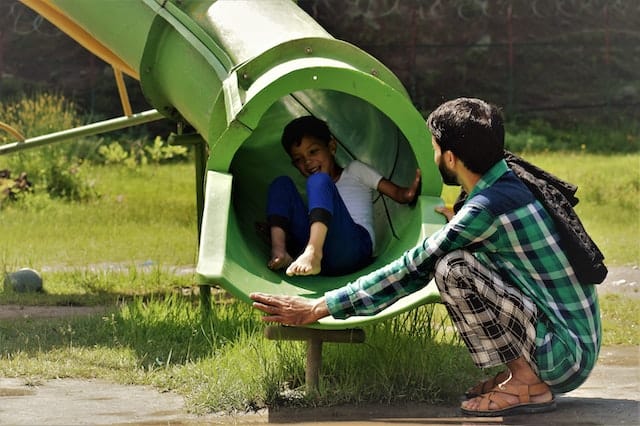Child custody below 7 years old is a complex issue. Due to the early age and vulnerability of children under that age, the court’s decision regarding child custody below 7 years old is even more crucial.
Parents are encouraged to reach a custody agreement through a parenting plan or consent order, but the court must still authorise the agreement to ensure that it is in the child’s best interests.
Best Custody Schedule for Child Under 7 Years Old
Our child custody lawyers say that there is no one-size-fits-all answer to the question of what the typical child custody arrangement is for children under the age of seven.
Each custody arrangement should be tailored to the child’s and family’s specific requirements and circumstances.
Typically a child between 3 – 7 years old has overnight time with the non-primary carer parent.
However, when it comes to children younger than 7 years old, parents may contemplate the following common custody arrangements:
- Every other weekend: Under this arrangement, the child spends every other weekend with the non-custodial parent and resides primarily with the custodial parent during the week.
- One weekday and every other weekend: The child spends one weekday overnight (like a Wednesday) and every other weekend with the non-custodial parent, while residing primarily with the custodial parent during the week.
- Two weekends per month: The child spends two weekends per month with the non-custodial parent while residing primarily with the custodial parent during the week.
- Alternating weeks: In this schedule, the child spends alternating weeks with each parent, which means the child lives one week with one parent and the next week with the other parent.
- 2-2-5-5 schedule: The child spends two days with one parent, two days with the other parent, five days with the first parent, and then five days with the second parent.
Also read: When Can a Child Make Custody Decisions?
Custody Factors Considered for Children Under 7 Years Old
Understanding the specific custody factors considered for children under seven is essential for parents and legal professionals alike as they navigate the complexities of family law.
Physical and Legal Custody
In Australia, custody refers to both legal custody and physical custody.
Legal custody refers to the right to make major decisions about the child’s life, such as about education, religion, and medical treatment.
Physical custody, on the other hand, refers to the right to have the child live with you.
In the majority of cases, the court will order joint legal custody, which means that both parents have the right to make significant decisions regarding the child’s life.
However, physical custody can be more contentious, particularly for children younger than 7 years old.
Also read: Custody Disputes Involving a Child with Autism
The Best Interests of the Child
When it comes to child custody below 7 years old, the court will consider several factors in determining the best interests of the child. These factors include:
- The child’s age, gender, and level of maturity.
- The relationship between the child and each parent, including the quality of the child’s attachment to each parent.
- Each parent’s capacity to meet the physical, emotional, and developmental requirements of the child.
- The child’s preferences, if old enough to communicate them.
- The willingness of the parents to foster a relationship between the child and the other parent.
Primary Caregiver
Who the child’s primary caregiver is may be considered by the court when determining custody of a child under 7 years old.
The primary caregiver is the parent who has provided the most day-to-day care for the child, such as feeding, bathing, and sending the child to bed.
In some instances, the court may place greater emphasis on the child’s relationship with the primary caregiver than on other factors.
However, this does not automatically grant custody to the primary caregiver. The court will continue to consider all relevant factors and base its decision on the child’s best interests.
Also read: Custody and Breastfeeding: Factors, Visitation & Importance
Parenting Plans and Consent Orders
In Australia, parents are encouraged to reach a custody agreement via parenting plans or consent orders.
A parenting plan is a written agreement between the parents that outlines how they will share parental responsibilities and make significant life decisions for their child.
A consent order is a court order that represents the parents’ accord.
When it comes to child custody below 7 years old, the court will still need to approve the parenting plan or consent order to ensure that it is in the best interests of the child.
Additionally, the court may order a family report or appoint an independent children’s attorney to aid in decision-making.
When constructing a custody schedule, parents must consider the child’s age, routine, and personality.
Parents may also seek the assistance of a family lawyer or mediator in drafting a custody arrangement that is in their child’s best interests.
If the parents cannot agree on custody, the court may also consider the child’s needs and circumstances when making a custody determination.
Also read: Key Factors to Consider in Custody for Children Under 2
Conclusion
Child custody below 7 years old is a complex issue that requires careful consideration of the best interests of the child.
Parents are encouraged to reach a custody agreement through a parenting plan or consent order, but the court must still authorise the agreement to ensure that it is in the child’s best interests.
Director of Melbourne Family Lawyers, Hayder manages the practice and oversees the running of all of the files in the practice. Hayder has an astute eye for case strategy and running particularly complex matters in the family law system.





